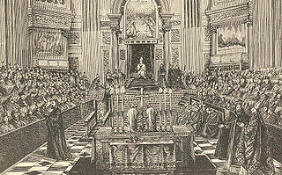
A Manual Of Councils Of The Holy Catholic Church -Rev. Edward H. Landon. M.A.
K
KELLS (1152). Held at Kells, in Ireland, March 9th, 1152, by John Paparo, cardinal, priest, and legate apostolic of Eugenius III., whom the latter had sent into Ireland to confer the pall upon four archbishops, of Armagh, Dublin, Cashel, and Tuam, which was done in this synod. Some of the Irish bishops as well as of the inferior clergy, refused to obey the legatine summons, and to sanction by their presence this innovation. (See Council of HOLMPATRICK, A.D. 1148.)—Bp. Mant’s Hist. Irish Church, p. 6. Tom. x. Conc. p. 1130.
KIEFF (1147). Held about 1147, by order of Isagaslaff II., Prince of Kieff; Onuphrius of Chernigoff presided. Theodore of Bielgorod, and several other bishops were present, who proceeded to the election of a metropolitan in the place of Michael II. With the exception of Niphont of Novgorod, they all agreed to take the election into their own hands, without allowing to the patriarch of Constantinople the exercise of his right either to nominate or confirm. Niphont strongly protested against the step, but without effect. The choice of the synod fell upon Clement, a monk of Smolensko. As a substitute for the patriarchal consecration, Onuphrius proposed that the hand of St Clement of Rome, whose relics had been brought from Cherson, should be placed upon his head.
This election led to great disorder; and subsequently the patriarch, Luke Chysoberges, consecrated Constantine metropolitan, who condemned the acts of this synod, and suspended, for a time, all the clergy ordained by Clement.—Mouravieff’s Hist. Russ. Church, by Blackmore, p. 35.
KIEFF (1622). Held by Job, Metropolitan of Kieff, in 1622. Meletius, Archbishop of Polotsk, at one time a most zealous defender of the orthodox Church in Russia, had been obliged to flee into Greece, upon a groundless suspicion of having been concerned in the murder of Jehoshaphat, the Uniate Archbishop of Polotsk, and urged by fear, had given himself up to the Uniate party, and written an apology in censure of the orthodox Church; in this council he was called to account—made to perform open penance, and to tear his book.
Soon after he entirely apostatised; and, going to Rome, had the title of Archbishop of Hieropolis conferred on him.—Mouravieff, p. 179.
KIEFF (1636). Held by the celebrated Peter Mogila, Metropolitan of Kieff, in order to revise his book, entitled, “The Orthodox Confession of Faith,” written to confirm his people, distracted by contradictory doctrines in the true faith.
KINGSBURY (851). [Concilium Kingsburiæ.] Held in 851, at Kingsbury, under Bertulphus, King of the Mercians; Ceolnoth, Archbishop of Dover, and other Mercian bishops being present. A charter was granted by the king to the abbey of Croyland, containing very extensive privileges.—Tom. viii. Conc. p. 73.
KINGSTON (838). [Concilium Kingstoniæ.] Held in 838, Egbert, King of the West Saxons, being present, and Ceolnuth, Archbishop of Dover (or Canterbury), presiding. In it Egbert and his son made a free donation of the manor of Malling, in Sussex, to the Church of Christ, and those who should at any future time dare to violate this gift, were declared to be separated from God, and it was prayed that their lot might be with the devil and his angels. Tom. vii. Conc. p. 1769.
KIRTLINGTON (977). [Concilium Kirtlingtonense.] Held about Easter, 977, in presence of King Edward, Dunstan presiding. The chief event recorded in this council was the sudden death of Sideman, Bishop of Crediton, in Devonshire, in which church the deceased had provided in his last will that he should be interred; but Dunstan and the king commanded him to be buried at St Mary’s, Abingdon, where he was honourably interred in the northern part, in the porch of St Paul.—Wilkins’ Conc., vol. i. p. 262.
Copyright ©1999-2023 Wildfire Fellowship, Inc all rights reserved

 Keep Site Running
Keep Site Running